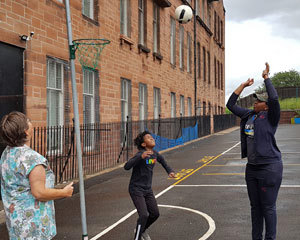West Partnership Storyboard Project
How to use this exemplar to improve practice?
 Through the reflective questions below, practitioners are invited to consider how their current practice compares to that provided in the storyboard.
Through the reflective questions below, practitioners are invited to consider how their current practice compares to that provided in the storyboard.
Improvement Reflective Questions:
- How does the practice demonstrated in the storyboards relate to our own practice?
- What are the strengths and limitations of our current practice in relation to the topics of the storyboard?
- Could we adopt relevant practices and processes presented in the storyboards to improve our own practice?
- Could we make adaptations to the practices and processes presented in the storyboards to improve our own practice?
Explore this exemplar
What was done?
 A series of interviews was conducted by The West Partnership to further understand how schools and services had adapted their practice to respond to the COVID–19 pandemic.
A series of interviews was conducted by The West Partnership to further understand how schools and services had adapted their practice to respond to the COVID–19 pandemic.
The West Partnership were keen to explore what changes had been made to practice in the areas of Parental Engagement, Family Learning, Learner Wellbeing, Additional Support Needs and Transitions. They were also keen to understand what impact these changes had made and what lessons could be learned for future.
Storyboards were written by the West Partnership and reviewed by contributors to ensure accuracy.
Why?
The primary purpose of the Storyboard Project was to share practice around the West Regional Improvement Collaborative. It is also hoped that practitioners will use the storyboards as a stimulus for reflection on their practice in Parental Engagement, Family Learning, Learner Wellbeing, Additional Support Needs and Transitions.
The storyboard project and interview process provided practitioners with the opportunity to reflect upon their work, progress to date and consider next steps.
What was the impact?
Key themes have emerged across the case studies which demonstrate their impact. These include:
- An increase in confidence amongst parents and children
- Home routines improved as a result of the various interventions
- More effective partnership working between sectors and families
- Better engagement strategies resulting from strategic planning
- Increased engagement with parents and families
- The capacity of parents increased as a result of practical resources and support packs
- Access to a variety of activities and resources online which supported parents and families to learn together at home.
Download(s)
PDF file: Family learning case studies (1.8 MB)
PDF file: Transitions case studies (3.1 MB)
PDF file: Learner wellbeing case studies (1.8 MB)
PDF file: Parental engagement case studies (1.8 MB)
For more information about the West Partnership Networks please visit: The West Partnership
